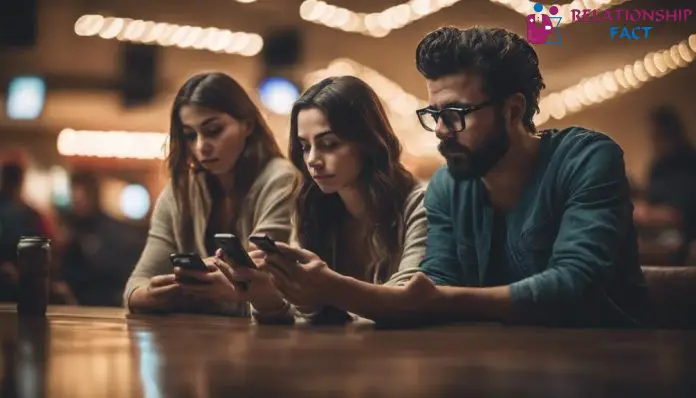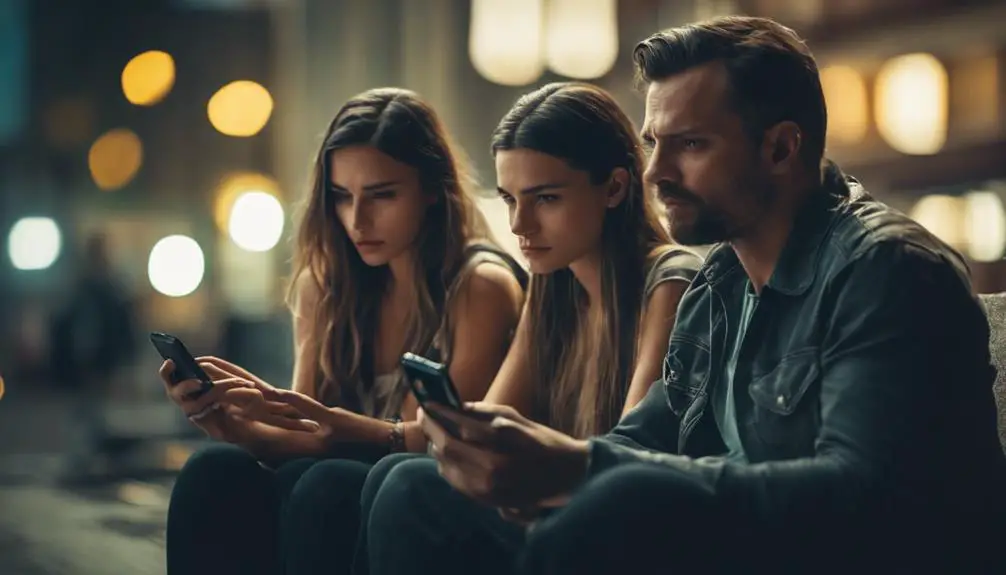
Imagine social media as a double-edged sword, cutting through the fabric of friendships and relationships with its virtual blade. The impact of social media on these important human connections is profound, shaping interactions in ways both positive and negative.
As you navigate through the digital landscape of likes, comments, and shares, you might find yourself pondering the true essence of companionship in a world where virtual validation often overshadows genuine human connection. But fear not, for there are insights to be uncovered and strategies to explore in order to navigate this complex terrain and foster meaningful relationships amidst the digital noise.
Key Takeaways
- Social media alters trust levels and communication patterns among friends.
- Online interactions can enhance or challenge the closeness between friends.
- Maintaining a positive online image can strain trust in friendships.
- Social media fosters closeness and intimacy within friendships through visual communication.
Evolution of Communication Through Social Media
The evolution of communication through social media has fundamentally reshaped how individuals connect and interact in today's digital landscape. Social media platforms like Facebook, Instagram, and Snapchat have revolutionized the way people communicate with friends, enabling instant messaging, visual sharing, and real-time interactions.
Online interactions through social media have become essential for modern communication, particularly among younger generations. These platforms haven't only facilitated the formation of friendships but also influenced peer relationships by providing new avenues for expressing emotions and sharing experiences.
As individuals navigate the dynamic nature of social media, they continue to explore novel ways of building and maintaining relationships in the digital age.
Influence on Friendship Dynamics
Social media platforms have the potential to alter the dynamics of friendships by influencing trust levels among friends. Communication patterns may shift as individuals rely more on digital interactions rather than face-to-face conversations, impacting the depth of connections.
The closeness between friends can be both enhanced and challenged by the constant presence and influence of social media in their interactions.
Trust in Friendships
Influencing friendship dynamics, trust can be greatly impacted by interactions on social media platforms among teens. Social media plays a significant role in shaping trust levels among friends, with 82% of teens feeling more connected to their friends' lives through online platforms.
However, online communication can complicate trust dynamics, as 76% of teens believe that individuals present different versions of themselves online compared to offline interactions. This discrepancy can lead to challenges in determining authenticity, as 77% of teens perceive people to be less genuine on social media than in real life.
Additionally, the pressure to maintain a positive online image can strain trust in friendships, with 40% of teens feeling compelled to portray themselves in a favorable light online. These factors collectively influence how trust is established and maintained in friendships within the digital age.
Communication Patterns Shift
Shifting communication patterns on social media platforms have greatly impacted the dynamics of friendships, altering how friends engage and connect in the digital domain. The prevalence of instant messaging, photo sharing, and video calls on social media has transformed the way friends interact online.
Platforms like Instagram and Snapchat have shifted towards visual communication, changing how friends express themselves virtually. Real-time updates and continuous engagement on social media influence the pace and depth of interactions within friendships.
The availability of various communication tools online has revolutionized how friends stay connected and share experiences through social media. These changes in communication patterns reflect the evolving nature of friendships in the digital age, where online interactions play a significant role in maintaining and fostering relationships.
Impact on Closeness
Enhancing the depth of emotional connections, social media platforms offer unique avenues for fostering closeness and intimacy within friendships. The quality of social media interactions plays a vital role in shaping the perceived social support among close friends. Spending time engaging with friends online can strengthen bonds and create a sense of companionship and support.
Visual communication tools on social media platforms, such as emojis and gifs, can affirm and strengthen the emotional connection between friends. Adolescents, in particular, utilize social media to express their emotions, fostering a deeper understanding of each other's feelings.
Role in Romantic Relationships
Social media platforms have become integral in fostering trust in romantic relationships, as individuals often share aspects of their lives to create transparency and connection.
However, challenges in online communication can arise, leading to misunderstandings and conflicts that may impact the quality of relationships.
Understanding the nuances of social media interactions within romantic partnerships is important for maintaining healthy communication and trust.
Trust in Romantic Relationships
Trust forms the cornerstone of successful romantic relationships, greatly impacting emotional connection and overall satisfaction. Building trust in a romantic relationship involves elements such as honesty, reliability, effective communication, and consistency in actions and words.
Trustworthiness contributes to feelings of security, respect, and mutual support within the partnership. Conversely, a lack of trust can result in conflicts, insecurities, and breakdowns in communication between partners. Trust issues in romantic relationships may arise from past experiences, barriers to communication, or differing expectations.
Addressing and resolving trust issues in a relationship are essential for fostering a healthy and fulfilling bond based on mutual understanding and support. Trust serves as a crucial component in maintaining long-lasting and meaningful romantic connections.
Communication Challenges Online
Exploring the world of online communication presents significant challenges in maintaining the depth and intimacy essential for successful romantic relationships. Social media platforms, while offering convenience, can also introduce communication challenges in romantic relationships.
The absence of non-verbal cues like body language and tone of voice in online interactions can create miscommunications and misunderstandings between partners. Text-based conversations may lack the depth and nuance present in face-to-face communication, hindering emotional connection and intimacy.
These challenges can amplify existing communication issues, leading to conflicts that strain trust, empathy, and mutual understanding in romantic relationships. Sailing through these obstacles requires active efforts to clarify intentions, express emotions clearly, and prioritize open and honest communication to foster healthy and fulfilling relationships.
Impact on Trust and Transparency

Amidst the digital landscape of social media, the perception of authenticity and transparency in interpersonal interactions undergoes a significant shift. Research indicates that individuals, particularly teens, feel pressured to present a curated, positive image online. Studies show that 85% of teen social media users believe that people showcase different sides of themselves online compared to offline, leading to a perceived lack of authenticity.
Additionally, 77% of teens think that individuals are less genuine on social media than in real life. The pressure to post attractive and positive content to gain popularity further exacerbates the issue, creating a perception of inauthenticity. This dynamic can erode trust and transparency in relationships, as online personas may not always align with real-life identities.
Effects on Social Interactions
Social media interactions greatly impact individuals' emotional expressions and relationships, influenced by adrenaline spikes and heightened emotions experienced online. Spending excessive time on social media can lead to increased feelings of loneliness and depression, particularly among teenagers.
While social media offers a platform for staying in touch, it can also disrupt real-life interactions and mental health. Research indicates that receiving social support through online platforms can positively influence well-being, but this must be balanced with offline connections.
Engaging in online disputes can alter perceptions and strain relationships, emphasizing the need for mindful interactions. Finding a vital balance between virtual and face-to-face interactions is essential for maintaining mental and emotional wellness in today's digitally connected world.
Challenges of Maintaining Connections

Handling the complexities of social media can present significant obstacles when it comes to maintaining genuine connections with peers, especially for teenagers feeling the pressure to constantly engage to preserve friendships. The overwhelming amount of social information and the need to stay connected online can lead to added stress and anxiety in teen friendships.
Teens often find themselves fretting over text wording and response times, which can strain their interactions on social media. Additionally, the influence of peers' posts and shares can impact how adolescents manage their connections, sometimes leading to misunderstandings or miscommunications.
As a result, the challenges of maintaining friendships on social media contribute to rising rates of anxiety, depression, and feelings of hopelessness among teenagers, highlighting the importance of addressing these issues for healthier online relationships.
Strategies for Healthy Online Relationships
Implementing clear boundaries for social media usage is important in fostering healthy online relationships and preventing burnout.
Communicate openly with your online friends about your needs and expectations to enhance mutual understanding and respect.
Prioritize quality interactions over quantity to develop deeper, more meaningful relationships.
Remember to take breaks from social media and practice digital detoxes to maintain mental well-being and avoid becoming overly reliant on virtual connections.
Seek support from trusted individuals offline to gain a balanced perspective and guarantee a healthy relationship with social media.
Frequently Asked Questions
How Does Social Media Affect Relationships and Friendships?
Social media affects relationships and friendships by influencing communication patterns, creating pressures to constantly engage, and blurring boundaries between personal and digital interactions. Maneuvering these dynamics requires awareness, balance, and setting healthy boundaries.
How Does Social Media Impact You and Your Friends?
In your daily interactions, social media acts as a bridge connecting you to friends, shaping your perceptions and behaviors. It influences your maintenance of friendships, adding pressure with overwhelming social information to manage.
What Is the Negative Effects of Social Media a Connecting With Friends?
When connecting with friends on social media, you may experience negative effects like feelings of exclusion, comparison, and pressure to conform to idealized standards. These impacts can harm your self-esteem and mental well-being.
How Has Social Media Affected the Dynamics of Personal Relationships and Friendships?
In your interactions, social media subtly shapes your personal relationships and friendships. Symbols of likes and shares can influence emotions and connections. Heightened awareness of these digital dynamics can enhance understanding and communication with others.
Conclusion
In summary, while social media has revolutionized the way we communicate and connect with others, it has also brought about complex challenges in our friendships and relationships.
Balancing the digital world with real-life interactions is vital to maintain genuine and fulfilling connections.
By acknowledging the impact of social media on our relationships and implementing strategies for healthy online interactions, we can navigate this new landscape with awareness and intention.





